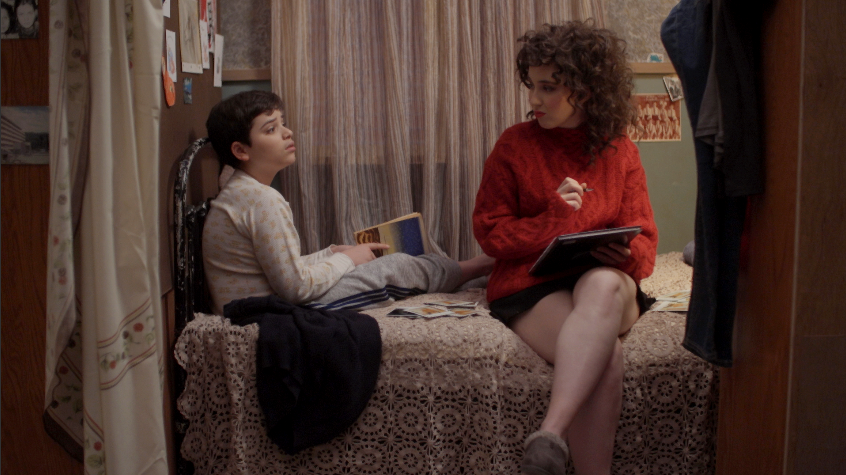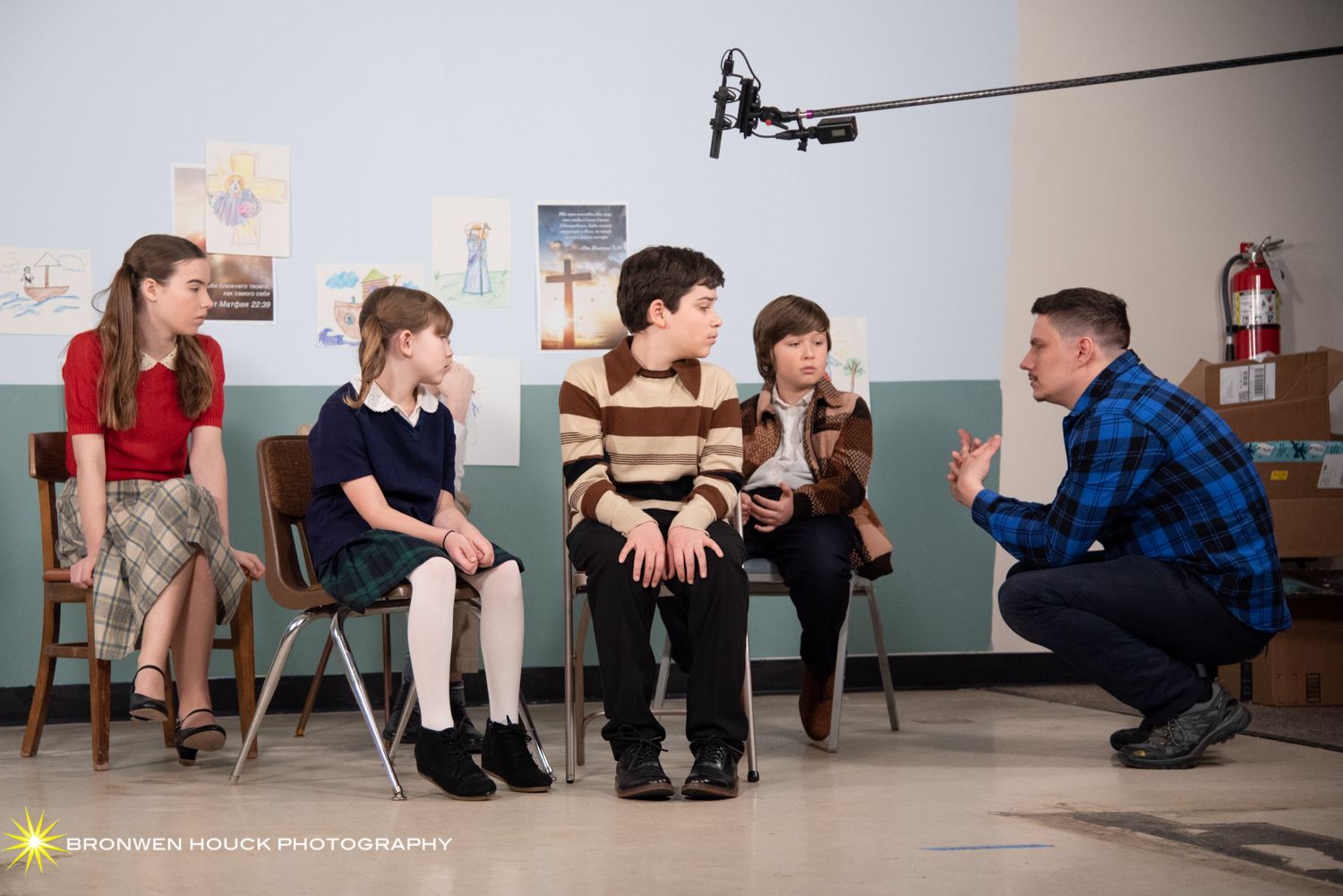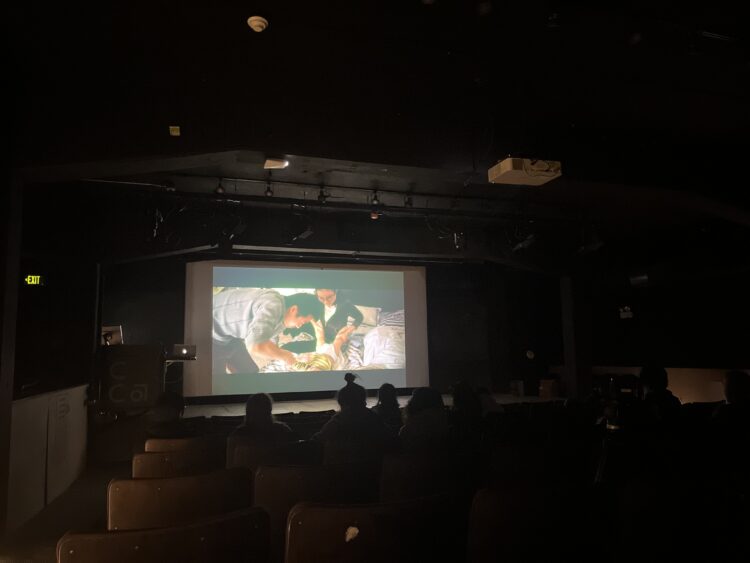From Perestroika Russia to Late ‘90s Seattle: Wes Hurley Tells His Story in a New Film

Film still from Potato Dreams of America by Wes Hurley, 2021
The stories behind immigration to the United States are infinite and varied. Wes Hurley, a filmmaker who moved from Russia to Seattle as a closeted teenager with his mother when she married an American in the 1990s, tells his story in the Creative Capital Project, Potato Dreams of America. American rom-com films were one of the only sources of escape from the hardships Hurley and his mother, a trained doctor working in a prison, faced in the crumbling USSR. When they moved to Seattle, Hurley found the city open and welcoming—except for his conservative stepfather, who Hurley’s mother married as a mail-order bride. After years of fundraising for this narrative feature film, Hurley received a Creative Capital Award in 2019, finally allowing him to complete the project, which premieres at SXSW, March 16-20.
We spoke to Hurley about the truth behind the movie, the inspiration behind the intricate set design, and how life compared between the United States and the former Soviet Union.
Alex Teplitzky—Tell me about the story of the film.
Wes Hurley—I was asked to write an article about being gay in Russia during the time of the Sochi Olympics, and the article went viral. It ended up being on Huffington Post, and people started reaching out to me. It made me realize that people don’t really understand what being gay was like in the former Soviet Union. I started to explore the idea of writing a screenplay. I wrote it pretty quickly because it’s something that is my life, it’s always been on my mind. I wrote it for a lot of specific actors in Seattle that I have collaborated with before.
The story is basically about me growing up gay in the USSR right as it’s falling apart, during perestroika. My mom was a doctor in a prison, and she really struggled with corruption there and all around. She decided to become a mail-order bride to come to the states. It was an escape for both of us, inspired by American films. We were obsessed with American films that we got through pirated copies.
The first half of the film takes place in Russia, and the second half takes place in the US, as we arrived in Seattle in the late ’90s. I don’t want to give away too much, but it revolves around my stepfather, who turned out to be very different from what we expected, and there’s a big twist in the end.
Alex—Watching the film, I was thinking about the parallels between the character of your mom and the city of Seattle. Both are a real refuge for you, they are open to you and the lives of other nonconformist people. It’s so amazing that you ended up in Seattle because it really seemed like a place that was welcoming in a way that perestroika Russia was not.
Wes—My mom is my biggest hero. The film is very much a celebration and a tribute to my mom. I still don’t understand how she had such an open mind, and progressive values, even though everyone around us, including our family, didn’t. I was very lucky to be raised by her. She was very proactive in shielding me from the bigotry and prejudices of the culture in Russia, including antisemitism, racism, even homophobia to some degree, though we didn’t really talk about that back then because it was so hidden and suppressed. So, I’m just really impressed with my mom. I have no idea how she ended up being the person she is, knowing the environment and the family she comes from. The story is a tribute to motherhood, and what a lot of moms went through to save their children.
“There was a lot of abuse and crazy dynamic in my early childhood, and I would literally imagine that my life was a movie. So, it’s kind of honoring that little kid in a way, to finally make that movie. At first it was a defense mechanism to stay sane, and now it’s my art.”
We were so lucky to come to Seattle. It was basically as opposite from Vladivostok as you could get. First of all, it’s a beautiful, beautiful city. Then, it’s so open and friendly. There are so many cultural differences that were just shocking to us in a good way. Like, walking down the street and people smile at you and don’t sneer at you. They’re nice to you when you go to the store. People are friendly. And then in terms of being gay, although I couldn’t be out initially because of my conservative stepfather, I could tell that it was accepted. It was very shocking, and it took me time to accept that.
In Russia, when I grew up, being gay was like being less than an animal, or worse than a serial killer. You’re brainwashed into feeling like you’re subhuman. Even though I wasn’t out, I knew I was one of those people. Coming to Seattle, I realized that I was a human being, and people treated me like that. It wasn’t something that I took for granted, it was something that I had to slowly come to accept, obviously, in a good way.
Seattle in the ’90s was already ahead of the country in many ways. Nationally, we’re still having discussions about hate crime legislation, equal rights, discrimination. Seattle, municipally, already had a lot of protections, and gay people were very much included in governance, positions of power, and the business community. Coming from Russia, it felt like a different planet to me. There were things like rainbow stickers saying the school was a safe space, and that you could speak to the teacher if there was an issue. It was really amazing.
Alex—You mentioned that American films were influential to you, and that is clear watching the film, which is very self-referential. The interior set designs based in Russia were very beautiful.
Wes—Yeah, thank you. I wanted the film to have two different looks. The idea was that the United States would look informed by the ’90s optimistic comedy-dramas, that we watched and that inspired us. For Russia, I recreated the world based on my childhood memories, and that world doesn’t exist anymore. I also don’t have the resources to go to some former communist country, bring a whole crew there and try to recreate that. But I wanted to embrace that it’s a very theatrical, almost fantastical world, with elements of magical realism—it is a child’s memory of what it was, instead of bringing you really into it. I wanted to embrace the artifice as much as possible. One of the things that inspires me is Baroque paintings like Caravaggio. So, I tried to embrace that and embrace the flatness of the images and these tableaux that are still.

Wes Hurley directs child actors on the set of Potato Dreams of America. Photo: Bronwen Houck.
My production designer Kristen Bonnalie was incredible to help build this world on a minimal budget. I still can’t believe the stuff she accomplished, especially when it came to Russia. In America, we found locations and restyled them. But when we were shooting Russia, she built so many sets. Basically, we built a sound stage made out of an old Staples warehouse. She built all the sets, and she was so ingenious in how they were used because she had very limited support in terms of money and labor. We had to transform our spaces that had layers and layers of texture and design. You could strip one layer and it would become a different set.
The other thing I’m really proud of in this movie is the score. It was an original score by Catherine Joy and Joshua Kohl, who is another Creative Capital Awardee. I wanted the two halves of the movie to look and sound completely different, and they did such a beautiful job. They did collaborate, so there are motifs that flow from one to the other, but they’re very different. Katherine’s half of the film is a very Hollywood style, mid-90s, late ‘80s kind of score. Joshua’s is a very experimental score. We had a full orchestra from Macedonia perform and record it. It was an amazing gift for a movie with such a tiny budget to have a real, epic score with so many musicians involved.
Alex—I was taken aback in the first half when the Russian characters were speaking perfect American English. It really put you in their shoes. Usually when you see a scene like that in a film, people are speaking with a Russian or British accent, or something to show that they’re foreign. But here you connect with their struggles right away, instead of seeing them as foreign or different.
Wes—Yeah, I really wanted that effect. I wanted to contrast how it feels to be an immigrant, when you enter a new country and really feel like you are an alien. You’re in a different world, and there is this feeling of otherness, and almost regressed childhood. My mother was a super educated doctor, but suddenly she was like a child because she couldn’t communicate in the same way. I thought that the only way to capture that was to make them accessible, as American as possible in Russia so that you feel like they’re in their own world. They’re comfortable in terms of language.
Coming to the states is like a second birth almost. You grow up again in a way.
Alex—We’ve heard your story told in different formats. I’ve heard it as part of a podcast, and you mentioned the article you wrote. But it’s always just as captivating as hearing it for the first time. Why did you think it was necessary to tell it in through a film?
Wes—It’s my medium. I did a documentary because I thought that might be successful and help me leverage it to make the feature. But narrative filmmaking is what I love doing. So it’s something that I always imagined that I would tell the story. In a way, it also goes back to my childhood—and I showed in the film—there was a lot of abuse and crazy dynamic in my early childhood, and I would literally imagine that my life was a movie. So, it’s kind of honoring that little kid in a way, to finally make that movie. At first it was a defense mechanism to stay sane, and now it’s my art.
Alex—This is your first feature-length film?
Wes—It’s actually my fifth, but it’s the first film where I had investors, and I was able to pay people. I made guerilla style, and other features before.
Alex—Ok, but still, it’s the first narrative film you made about your life. I imagine it felt unreal and weird.
Wes—It was definitely surreal at times. The fact that I was trying to raise the money for so long, and spoke about it for so long, then the documentary and a VR piece, that SXSW is also showing. It really desensitized me to it. By the time I was shooting and editing this feature, it really didn’t feel like me in a way.
I would have moments, where—because it’s really close to what happened, some of the conversations are like 99% verbatim from how I remember them—I would feel like this is so weird. But most of the time I would disassociate and think of it in the third person, thinking about the story, worrying about how people would see it who were not familiar with the story. It was helpful, too, to name the character Potato. It was one of my tools when i was writing the script. It made it easier to process.
Alex—Parts of the story are so crazy that it all happened to one person in their lifetime. If you made up this film, I think people would think it was too unbelievable to be in a movie, right?
Wes—[laughs] Oh, totally. Definitely!
Alex—It’s so important to know that the movie is based on a true story. I had heard of mail order brides, but I didn’t really think they existed, or that they had real lives as relatable as you and your mom. So, it was interesting to hear that story from this new perspective.
Wes—Thank you. People tell me all the time that they never thought of mail order brides as someone like my mom. And obviously she’s not representative of everyone, but it does show why people would want to do it, and the stakes involved for them.
Alex—So tell me about the film premiere at SXSW, and what’s next.
Wes—We’re super excited to premiere there, and that they featured me in the narrative competition. The hope is that we sell the film, and I would love to get an agent or manager out of this process. It was important because we did get some investors on board. If this is successful commercially, then I’m more likely to be supported in the future with other projects. It was really difficult for this film. Hopefully it can get easier to tell these kinds of stories.
Alex—I haven’t seen your other films. This was your story, but I’m wondering if there’s something specific in this story that you want to carry through to tell in other films?
Wes—The stuff I have done so far, other than Potato, has been out-there, avant-garde, very gay, queer, stylistically heightened stuff. I’m really proud of that work, especially the Capitol Hill series, which was made for Huffington Post initially, but then got picked up by television and in Europe and Canada. I love the aesthetic of it. What I’m realizing, through Potato, is that I do want to make stuff that has a larger audience. I really struggle with, when I write stories from scratch, my mind is really into unusual, nontraditional trajectory and narrative. I can’t write stuff that’s really accessible. If it comes from my mind, my mind always goes off.
But with Potato, and with future projects that I’m already planning, it’s a true story. That really grounds me, and I can still infuse it with my sensibility and style. In terms of the structure, I do want to honor that true story. My next project will be true-story based, but still have that kind of dark comedy, heightened sensibility.
Alex—Can you talk about how Creative Capital was helpful?
Wes—So, Creative Capital really made this project possible. Like I said, I was trying to raise money for many years. I’ve been really burned. This industry is very strange—there’s a lot of people promising you things that they don’t ever mean to fulfill. It was a very stressful and discouraging process. When I got the award—first of all, the budget was small, it was $250,000. The money from the award was a significant chunk of it. Also, by getting that money, it encouraged others. I could show that I already had some money in the bank, and that helped me get more investors. In addition, the prestige of it helps get others on board. For me, it was huge. Getting the award made a very practical difference. It wasn’t something esoteric or vague—it actually showed me that I could make the movie.
Coming to both the retreat and the orientation in New York—being exposed to so many amazing artists, and to be in the room with them, was so inspiring and encouraging, it made me feel like I was doing something right at this point in my career. I thought, if I’m here in the room with these people, then I’m doing something right. So it was really life changing beyond just the project. In general, how I see myself as an artist, to be there with those people was so inspiring.
